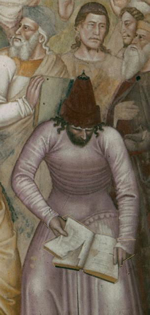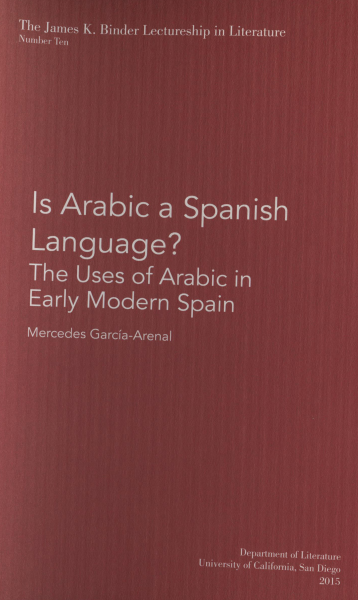Carla Ramos García, "Pedro Margalho, Enrique Nuñes Firme Fe y Etiopía en el establecimiento de la Inquisición portuguesa." Anais eletronicos del III Simpósio Internacional de Estudos Inquisitoriais (Alcalá de Henares, junio 2015). ISBN 978-85-61346-96-6, 24 págs.
You can read the chapter here.
______________________________________________________________________________________
Javier Albarrán Iruela, "He Was a Muslim Knight Who Fought for Religion, Not for the World.” War and Religiosity in Islam: A Comparative Study between the Islamic East and West (Twelfth century)." Al-Masaq, 27.3 (2015): 191-206.
Abstract: In the second half of the twelfth century, the Maghreb and the Mashriq saw two new political and religious projects taking place, which shared a common reformist spirit. The Almohad movement and the process initiated by Zankı¯ (r. 1127–1146) gave a crucial role to jihad, as well as introducing far-reaching religious reform, doing away with the supposed decadence that had taken hold in the years before. The combination of these two elements gave rise to a greater exchange between religiosity and war. A comparative analysis of Islamic sources from both east and west reveals this increase of religiosity in war in three different fields: the participation of religious elites in the armies; the rise in the use of rituals and religiosity while at war, by means of sermons, speeches and the use of “sacred” objects; and miraculous events related to acts of war.
Keywords: Jihad; Almohads; Zankı; Nural-Dın; Salahal-Dın; Crusades.
You can read the article here.
______________________________________________________________________________________
Katarzyna K. Starczewska, “No es esto sino hystorias de los antiguos: Between Medieval and Early Modern Narrations in Juan Andrés’ Confusión.” Medievalia 18.1 (2015): 217-27.
Abstract: Juan Andrés’ treaty Confusión o confutación de la secta Mahomética y del Alcorán is a meaningful example of how the typically medieval topics of anti-Islamic polemics are adapted into the Early Modern literally moulds. The interest in confuting Islam with the aid of the Qur’ān had been fuelling the literature of religious controversy long before Juan Andrés converted to Christianity and took up the quill to rebut his old faith. Nevertheless, his analysis of the content of the Qur’ān differs from the ones conducted before him. Moreover, the Quranic quotations inserted in Juan Andrés’ polemical text happen to coincide with the Latin translation of the Qur’ān commissioned by Egidio da Viterbo and its glosses. Therefore, the aim of this paper is twofold: firstly, to revindicate Juan Andrés’ autonomy and independence from Medieval polemics; secondly, to highlight the similarities and correspondence between Juan Andrés’ Confusión o confutación and Egidio da Viterbo’s Latin translation of the Qur’ān.
Keywords: Juan Andrés - Medieval and Early Modern Anti-Islamic Polemics - Latin Translation of the Qur’ān - Egidio da Viterbo
You can read the article here.
______________________________________________________________________________________
Mercedes García-Arenal, "Is Arabic a Spanish Language? The Uses of Arabic in Early Modern Spain."
The James K. Binder Lectureship in Literature Nº 10, april 16th, University of California San Diego, 33 pp. (2015)
Abstract: Starring in the sixteenth century, a new interest in Oriental languages arose in Europe, and in particular an interest in Arabic. This interest in Arabic stemmed from the textual study of the Bible, which so absorted Eropean scholars in the age of the Reformation and Counter-Reformation. This is, then, an early "Orientalism" that has little to do with colonial enterprises, and follows different paths than those outlined by Edward Said in his famous book Orientalism. It has traditionally been argued that Spain played no part in forming this Orientalist knowledge. In fact, from its European contemporaries of the sisteenth century down to the historiography of the twentieth century, Spain was essentially held to be an Oriental country itself, and therefore more of an object of "Orientalism" than an actual producer of Orientalist learning. This paper focus on these two assumptions by examining the situation of the study of Arabic in Spain, and showing how in Spain Arabic scholars were immersed in a very specific context and in an ideological debate in which the role of the Arabic language was a crucial one.
You can read the lecture here.
_____________________________________________________________________________________
 Special issue of the journal Al-Qanṭara 35-2 (2014), on The Qur’an in Early Modern Iberia and Beyond, [doi:10.3989] (see here the articles).
Special issue of the journal Al-Qanṭara 35-2 (2014), on The Qur’an in Early Modern Iberia and Beyond, [doi:10.3989] (see here the articles).
- Pier Mattia Tommasino, "Introduction. The Qur'an in Early Modern Iberia and Beyond". Al-Qanṭara 35-2 (2014): 397-408.
- Mercedes García-Arenal, and Katarzyna K. Starczewska. “ ‘La Ley de Abraham Catholico.’ Juan Gabriel, traductor del Corán para Martín de Figuerola y Egidio de Viterbo.” Al-Qanṭara 35-2 (2014): 409-459.
- Harm den Boer, and Pier Mattia Tommasino, "Leer el Corán en la comunidad sefardí de Amsterdam en el siglo XVII". Al-Qanṭara 35-2 (2014): 461-91.
- Nuria Martínez-de-Castilla-Muñoz, “Los copistas y sus textos. Las traducciones moriscas del Corán en la Biblioteca Tomás Navarro Tomás (CSIC, Madrid).”
- Roberto Tottoli, “El Corán de Toledo y la escatología islámica: traducir «infierno» en la literatura aljamiada.”
- Ulli Roth, “La traducción del Corán de Juan de Segovia.”
- Ulisse Cecini, “Algunas observaciónes sobre la traducción de los nombres propios en las traducciónes latinas del Corán de Marcos de Toledo y Robert de Ketton.”
